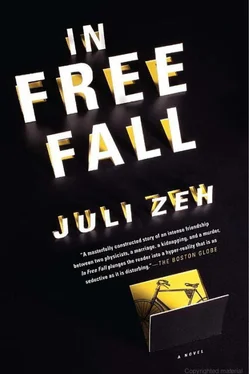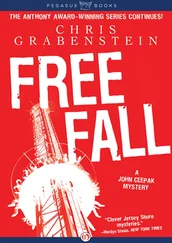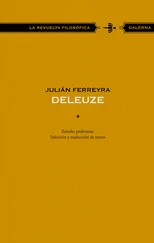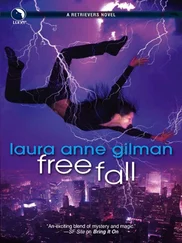“That you finally believe in the blackmail.”
“For goodness’ sake.” The cheerful Rita has disappeared. It is the police officer who is talking: cool, unscrupulous, and efficient. “You don’t seem to be up to speed. This Oskar person who brought the kidnapped boy to Gwiggen is Sebastian’s best friend.”
“The stuff of Greek tragedy,” Schilf says.
“I call that being an accessory to murder, and very clever, too. The professor has to get rid of a rival. His friend fakes a blackmail. Much better than a shaky alibi. I knew from the start that this was a crime of passion.”
“And that’s why you proceeded from the opposite of this conviction, right?”
“In any case,” Rita says, “crimes of passion are terrific. Crimes of passion have nothing to do with the hospital scandal.”
“Listen to me!”
The panic that the detective has made such an effort to suppress bursts forth so strongly that Rita falls silent for a moment. Schilf leans his forehead against a sandstone pillar and forces himself to speak quietly.
“You’re right, it could have happened that way. But I swear to you, Rita, that it didn’t.”
“Schilf…”
“It was a silly boy’s prank, thought up by a particularly dangerous boy. It was a great love, the Many-Worlds theory, and a masterwork by the most ruthless criminal that exists on this earth: coincidence. So ruthless that I prefer not to believe in him.”
“Detective Schilf?” Rita says. “Are you listening to yourself? Silly boy? Great love? Coincidence?”
“I can explain it all,” the detective whispers.
The little angel has reached out an arm, and his fingertips follow the lines of text on a board. He is saying something. The grown-up nods.
“I’ll bring the person who is the real culprit to you. He’ll confess. You can tell the powers that be that the case has been solved. Stop trying to beat me, Rita—help me!”
“But what are you expecting me to do, Schilf?” Rita cries.
The detective holds the phone away from his ear so that he can dry his forehead and cheeks. There is a ripple of movement below. The first few people are walking toward the stairs. Schilf bends down and picks up the briefcase wedged between his feet.
“Are you doing anything tonight?” he asks.
“Of course not.”
The two angels are floating up the stone staircase. Schilf retreats farther behind his pillar.
“I have to sort something out here first,” he says. “Don’t do anything. Be prepared.”
“One more question. Do you think this case has anything to do with hospitals at all?”
“Not in the slightest.”
“OK. See you later.”
The detective slips the mobile phone into his trouser pocket and waits until everyone else has entered the auditorium. Then he, too, produces his ticket and slips inside.
IT’S DARK. There are no seats. Everyone is clustered together looking at the dome above them, which is lit with a bluish glow. A teacher tells her giggling class to sit down on the floor, as they can’t keep their balance in the dark. The detective has some difficulty keeping his balance, too, as he pushes his way through the crowd. A giant spiral is beginning to turn in the artificial sky. E = mc 2 shoots across it like an asteroid. The children screech excitedly and duck.
“In the great play of Being, we are actors and spectators at the same time,” a male voice announces to open the show.
Schilf has found his two angels and is standing directly behind them. Every time the taller one moves her shoulders, the smell of her silky hair rises. She smells quite different from Julia—even sweeter. The aroma, as that of lime-blossom tea, calls forth images from the depths of his memory. This is my new past, Schilf thinks. I’ll remember this when I go: a man, a woman, and an excited boy turning their faces up to space. Perhaps a caress on the back, too, interlinked fingers, and a child’s head that fits neatly under the palm of the hand. Schilf almost taps his two targets on the shoulder; he stops himself just in time. Here, right in front of him, are two people whose future he is responsible for. Fate has united them with him in a tiny speck on the outer crust of this planet.
The time for unconscious living is past, the detective thought , the detective thinks. In the last few meters, life can no longer be worn like a shoe that you don’t notice as long as it doesn’t pinch your foot.
For a moment, Schilf is filled with such happiness that he feels like crying. But like most people, he has long ago exchanged the ability to cry with the desire for revenge. He understands perfectly well that he can no longer build a true home for anyone. He can only punish anyone who dares to destroy something as precious as a true home.
The detective takes a step backward; he has to concentrate to avoid tipping over. He feels the pulse inside the bird’s egg, and the way the second law of thermodynamics is working to throw him and his case into a state of increasing chaos. Soon he will no longer have the energy to fight against the dissolution. He has to make one final effort now. There is half a day and one night left. It is his last chance to put things in order. The two angels are holding hands. Images showing the collision of accelerated particles play in their hair.
“From all the possible outcomes, the one that has actually taken place is determined by the observer,” says the male voice coming out of the loudspeakers.
“I’m here,” Schilf says.
Maike’s back stiffens and she turns her head slowly.
“I know,” she says.
A violent explosion on the screen bathes the auditorium in white light. Every detail of Maike’s face can be seen, cool and impenetrable, like an overexposed photograph. Liam turns around, too, and his eyes look hard, like pieces of blue plastic. When he recognizes the detective, he turns his narrow back on him in a deliberate gesture.
“I can’t stand you following us,” Maike whispers.
“But I’m not following you!” the detective says in a suppressed shout.
“No elementary phenomenon is a phenomenon until it is an observed phenomenon,” the man’s voice continues.
A cartoon cat paces across the dome: the children cheer and a forest of arms rises from the human undergrowth.
“I wanted to ask you how you are,” Schilf whispers.
Maike laughs silently.
“Get lost. There’s nothing else you can get from us.”
The cat is shut inside a cardboard box. Schilf knows what is coming next. His reading on the Internet covered Schrödinger’s cat. As long as no one looks inside the box, the cat is both dead and alive at the same time, in a state called quantum superposition. From Maike’s point of view, Schilf and Rita are in just such a state. Maike cannot distinguish between them. Police work is police work. It is no use explaining that he has saved her husband the agony of remand, but that he cannot do anything about the way Sebastian is treated. Maike would certainly think he was lying.
The frantic ticking of a clock is getting on Schilf’s nerves, but he is relieved when he realizes it is coming from the loudspeakers this time, not from inside his own head.
“I’m terribly sorry about the search,” he says finally. “I must apologize on behalf of my colleague.”
“What search? What do you mean?” Maike asks.
“Don’t you know about it?”
“I haven’t been in the apartment since yesterday.”
“So…” Schilf says, feeling horror creep over him. “So you’ve left him?”
“He has left us, in both heart and mind. All we’ve done is move out of the apartment. A mere formality in comparison.”
“No,” Schilf says. “You’re wrong. Sebastian would never—”
Читать дальше












